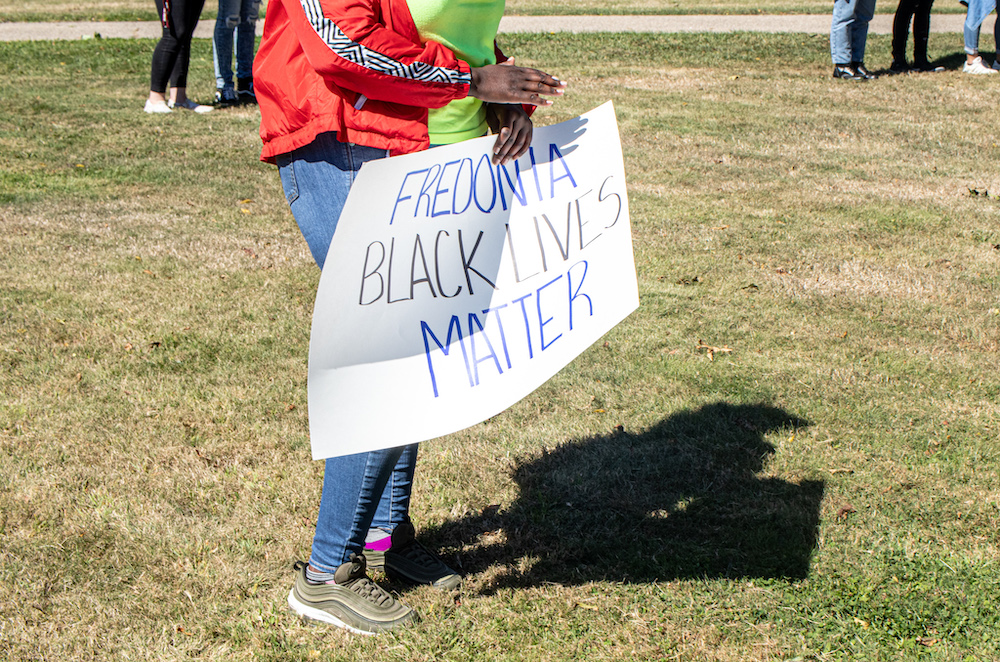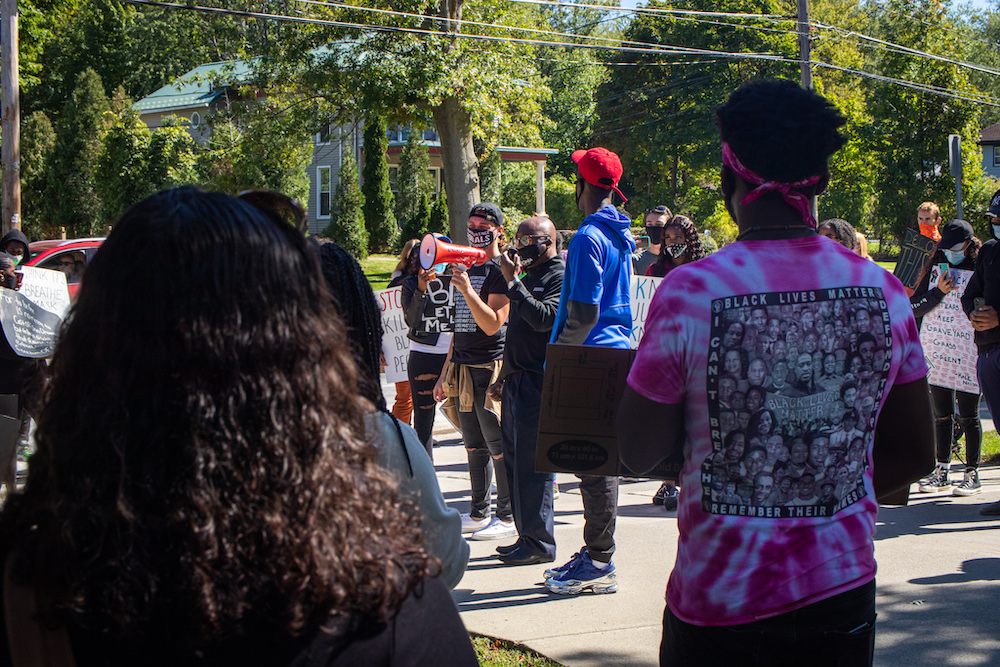JESSICA MEDITZ– Editor in Chief
HAWA TEJAN-COLE– Special to The Leader

Chants of “What do we want? Justice! When do we want it? Now!” echoed through downtown Fredonia on Saturday afternoon.
The voices were those of over 150 Fredonia students coming together to stand in solidarity with Black students at Fredonia, and with the Black Lives Matter movement as a whole.
The march began at Barker Commons, where participants were separated into smaller groups to follow social distancing guidelines.
Tim Snider, a senior at Fredonia and the organizer of the protest, reiterated this point to the students and that the intention of the protest was to remain peaceful.
“I am willing to do whatever it takes to make sure that this institution knows that Black lives matter, they matter today, they matter tomorrow, they matter forever,” said Snider.
“I think Fredonia has sat by for too long and neglected to show any type of support for the Black community, especially after the events of this summer… We pay thousands of dollars in tuition to go to an institution such as this one to develop new ways of thinking, new skills and new ways of becoming a productive member of society. Yet when it comes to using those skills for things that we believe, they get scared.”
Racial justice is a topic that college students are all too familiar with.
This past summer, the internet was filled with outrage toward the system and support for marginalized communities in response to the murders of unarmed Black people by police.
Fredonia students are no exception to this.
In addition to using social media platforms to promote anti-racism, some students have participated in protests in their own communities and worked on activism projects of their own.
SUNY Fredonia is no stranger to incidents that have been considered racist, either.
Just three years ago, a photo of a man in blackface at an off-campus Halloween party circulated on the internet.
Upon leaving the starting point, marchers made their way down Temple St. to campus.
The march paused briefly in Dods Grove, where students made speeches to the crowd.
One of these students was Abdullah Yusuf, a senior at Fredonia and a cofounder of the clothing brand, Jiggy By Nature.
Another was Lylens Lubin, the senior class president, who thanked everyone for coming out to support.
The march’s last stop was Central Ave., specifically to the home of the university’s president, Dr. Stephen Kolison.
A few moments after waiting, Kolison came outside to address the students and make a statement about how he plans to help Black students feel comfortable.
Several Black students at Fredonia are dissatisfied, and they argue that racism is upheld by the lack of diversity and higher education representation.
Deoniss Jackson, a 2020 graduate of Fredonia, returned to her alma mater for the protest.
“One thing that we’ve been asking for is that all faculty and staff [have] diversity training. We’ve been approved for it for years, and it’s never happened, she said.
“Another thing that we notice is that for Black students to have something that makes them feel comfortable too, they have to create it [themselves]. We have the Intercultural Center… and Admissions put on plenty of events, but they only cater to one community. They’re never welcoming to Black students; we walk in and they’re looking at us [with] side eye.”
Promoting racial equity on campus means admitting more students of color, hiring more diverse faculty members and expanding curricula to educate students about racial justice.
At a predominantly white institution such as Fredonia, Black students ask for campus officials to recognize that they need safe spaces where they can have a reprieve from anti-Black racism while providing them with tools and support to do so effectively.
Kolison’s response was nothing short of supportive.
“I want you all to feel [that] you belong at this university,” said Kolison.
“I work very hard to make sure that you feel this is your home, that you feel you can do well at this institution. It doesn’t matter where you come from… at this university, we want to do everything we can to make everyone feel like they belong, that is my commitment to you.”

The students applauded, and Kolison marched back with the group to show his support.
Despite being threatened with disciplinary measures as severe as expulsion, Snider said they have not faced any consequences from Fredonia faculty as a result of organizing the protest.
“I had a private conversation with [Kolison] after the protest and will be setting up a meeting with him along with other school leaders to work on a project surrounding the Black community,” said Snider.
In support of the protesters, cars honked, community members came out on their porches to cheer them on and others joined the march themselves.
The march was peaceful, and most of the response around town was positive, except for a few people that drove by to make opposing remarks.
That didn’t discourage anyone, though.
“We are in the middle of a great movement for equality; it would be negligent if we didn’t stand up and fight for what’s right,” said Snider.
“We have a duty as human beings to stand up for each other when one of us is being pushed down. I think more importantly though, it is such an important thing to have this protest because it shows that the students of Fredonia aren’t just staying silent. In this type of movement, silence is violence and I am determined not to be a part of that.”
Neither were the other students who walked beside them.
